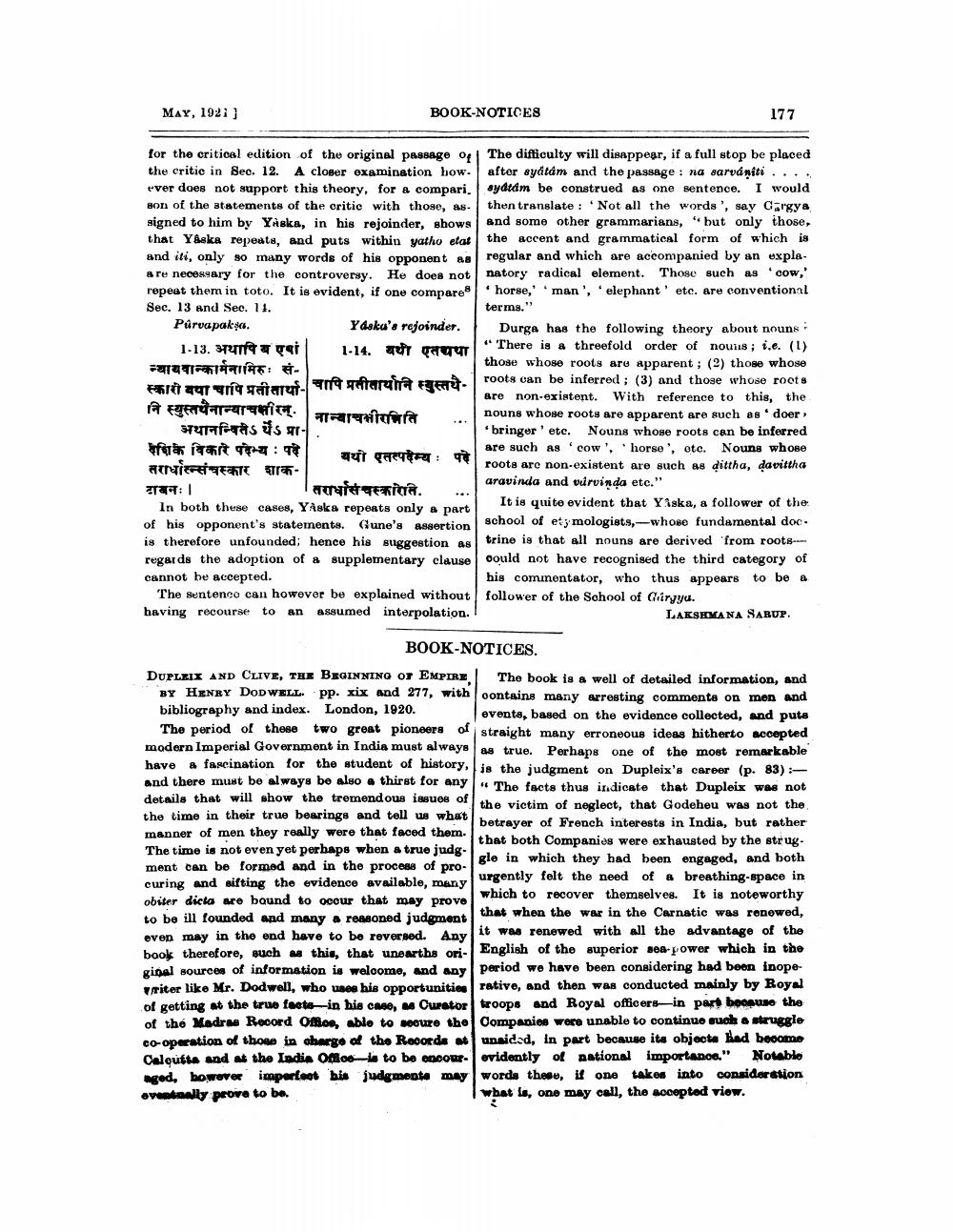________________
MAY, 1921)
BOOK-NOTICES
177
for the critical edition of the original passage of The difticulty will disappear, if a full stop be placed the critic in Seo. 12. A closer examination how after ayatam and the passage : na sarvaniti.... ever does not support this theory, for a compari. sydtam be construed as one sentence. I would son of the statements of the critic with those, as then translate : Not all the words ', say Careya signed to him by Yaska, in his rejoinder, shows and some other grammarians, but only those, that Yaska repeats, and puts within yatho etat the accent and grammatical form of which is and iti, only so many words of his opponent as regular and which are accompanied by an explaare necessary for the controversy. He does not natory radical element. Those such as cow, repeat them in toto. It is evident, if one compare horse,' 'man', 'elephant' etc. are conventional Sec. 13 and Sec. 1 1.
terms." Påruapaksa.
Yasku's rejoinder. Durga has the following theory about nouns 1-13. ayer 1-14.
a
** There is a threefold order of nouns ; i.e. (1) 1971 : -
those whose roots are apparent ; (2) those whose
roots can be inferred; (3) and those whose roots स्कारो वयाचापि प्रतीतार्था-चापि प्रतीतार्यानि स्वुस्तथै
are non-existent. With reference to this, the A Ferrari . Terrara ...
nouns whose roots are apparent are such as doer Surfcasis -
'bringer' etc. Nouns whose roots can be inferred देशिक विकारे पदेभ्य: पद यथो एतत्पदेम्यः
are such as 'cow', horse', etc. Nouns whose
पदे ANITET -
roots are non-existent are such as dittha, davittha T:
aravinda and vervinda etc." anteriga. ... In both these cases, Yaska repeats only a part
It is quite evident that YAska, a follower of the his opponent's statements. Gune's AggArtion school of etymologists, whose fundamental doc. is therefore unfounded; hence his suggestion as trine is that all nouns are derived from roots... regards the adoption of a supplementary clause could not have recognised the third category of cannot be accepted.
his commentator, who thus appears to be a The sentenco can however be explained without follower of the School of Clirgyu. having recourse to an assumed interpolation.
LAKSEMANA SABUP.
BOOK-NOTICES. DUPLEX AND CLIVE, THE BEGINNING OF EMPIRE! The book is a well of detailed information, and
BY HENRY DOD WELL. Pp. xix and 277, with oontains many arresting comments on men and bibliography and index. London, 1920.
events, based on the evidence collected, and puts The period of these two great pioneers of straight many erroneous ideas hitherto accepted modern Imperial Government in India must always as true. Perhaps one of the most remarkable have a fascination for the student of history, is the judgment on Dupleix's career (p. 83) : and there must be always be also a thirst for any The facts thus indicate that Dupleix was not details that will show the tremendous issues of the
the victim of neglect, that Godeheu was not the the time in their true bearings and tell us what
betrayer of French interests in India, but rather manner of men they really were that faced them.
that both Companies were exhausted by the strug. The time is not even yet perhaps when a true judg.
gle in which they had been engaged, and both ment can be formed and in the process of pro. curing and sifting the evidence available, many
urgently felt the need of a breathing-space in obiter dicta are bound to occur that may prove
which to recover themselves. It is noteworthy to be ill founded and many a reasoned judgment
that when the war in the Carnatic was renowed, even may in the end have to be reversed. Any it was renewed with all the advantage of the books therefore, such as this, that unearths ori
English of the superior sea-power which in the ginal sources of information is weloomo, and any period we have been considering had boon ipopeviter like Mr. Dodwell, who wes his opportunities rative, and then was conducted mainly by Royal of getting at the true facte-in his case, M Curator troops and Royal officers—in part boonuse the of the Madras Record Othon, able to wore the Companies were unable to continuo muok a struggle co-operation of those in charge of the Records at unsidad, in part because its objecta had become Caloutta and at the India Otools to be encour evidently of national importance." Notablo nged, however imperfeet his judgments may words these, if one taken into considerstion eventually prove to be
I what lo, one may call, the accepted viow.




